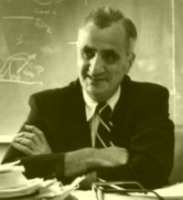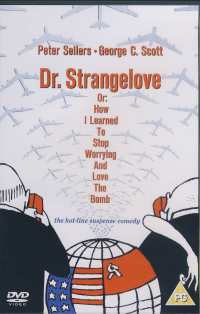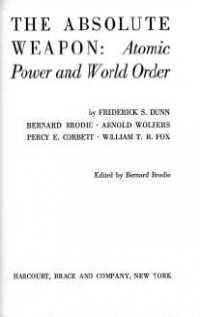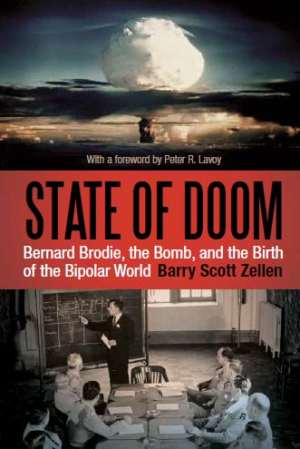

Bernard Brodie
*20.05.1910 in Chicago, Illinois
+24.11.1978 in Pacific Palisades, Kalifornien
US-amerikanischer Militärstratege und Politikwissenschaftler aus eingewandertem jüdisch-russischem Elternhaus; Professor für Internationale Beziehungen an der University of California, Los Angeles (UCLA), Mitarbeiter der RAND Corporation, strategischer Berater der US-Marine und der US-Luftwaffe; Mitwirkung bei der Gründungskonferenz der Vereinten Nationen in San Francisco; „Amerikanischer Clausewitz“.
Realist, anfänglich Seemachttheoretiker; von Carl von Clausewitz und Sigmund Freud beeinflußter und an Psychoanalyse interessierter Theoretiker des Nuklearkriegs; Sinn der Atombombe ist nicht, sie einzusetzen, sondern mit dem möglichen Einsatz zu drohen. Sein diesbezüglich berühmtester Satz lautet: “Thus far the chief purpose of our military establishment has been to win wars. From now on its chief purpose must be to avert them. It can have almost no other useful purpose.“ (The Absolute Weapon, 1946). In den 1950er Jahren einer der einflußreichsten Abschreckungstheoretiker und Militärstrategen in den USA; „Architekt“ der US-Nuklearstrategie; Vertreter der Zweitschlagstheorie, die besagt, daß Abschreckung nur über die glaubhafte Androhung eines massiven Zweitschlags möglich ist; Theoretiker des über den Zusammenhang von technischem Wandel und Militärstrategie; zusammen mit Michael Howard und Pater Paret verantwortlich für die Verbreitung der Ideen Clausewitz´ in den USA; Zusammenarbeit mit Henry Kissinger; Kollege von William W. Kaufmann und Herman Khan bei RAND.


Werdegang
Geboren am 20.5.1910 in Chicago als Sohn des Obsthändlers Max Brodie und seiner Frau Esther, geb. Bloch, jüdische Immigranten aus Rußland; der Bruder Leonard wurde Richter; im Elternhaus wurde Yiddish gesprochen
Studium an der Universität Chicago
1932 Bachelor-Examen
28.8.1936 Heirat mit Fawn McKay Brodie, spätere Autorin politischer Biographien
1940 Promotion in International Relations an der Universität Chicago
1941 Veröffentlichung von “Sea Power in the Machine Age”
1941 Carnegie Fellow am Institute for Advanced Study, Princeton
1941-1943 Instructur am Dartmouth College
1943 - 1945 im Dienst des U.S. Naval Reserve Bureau of Ordnance und des Office of the Chief of Naval Operations
1945 Technischer Experte der US-Delegation zur Gründungskonferenz der Vereinten Nationen in San Francisco
1945 – 1951 Associate Professor in International Relations und später Director of Graduate Studies an der Yale Universität
1946 Veröffentlichung des Sammelbands „The Absolute Weapon“ revolutioniert strategisches Denken in Richtung Abschreckung: Atomwaffen sind nicht dazu da, Kriege zu führen, sondern Kriege zu verhindern
1946 – 1947 Assistant Professor am National War College
1950 – 1951 Special Assistant des Generalstabschef der US-Luftwaffe
1951 – 1966 Mitarbeiter (Senior Staff Member) der RAND Corporation in Santa Monica, Kalifornien, Autor zahlreicher Memoranden und Research Papers zu militärstrategischen Fragen
1955 – 1957 Mitglied des Board of Consultants des National War College
1956 und 1960 Visiting Lecturer am Graduate Institute of International Studies, Genf
1959 Veröffentlichung von „Strategy in the Missile Age“ liefert die Grundlagen der Abschreckungstheorie (Zweitschlagsfähigkeit)
1960 – 1961 Paris-Aufenthalt als Carnegie Corporation Reflective Year Fellow
1963 – 1966 Visiting Professor am Department of Political Science, University of California, Los Angeles (UCLA)
1966 – 1977 Full Professor für Politikwissenschaft und Internationale Beziehungen, Department of Political Science, UCLA
1973 Veröffentlichung von „War and Politics“
1978 Emeritierung
gestorben am 24.11.1978 als Folge eines Krebsleidens, hinterließ drei Kinder Pamela, Richard M. und Bruce
November 1979 Gedächtniskonferenz an der UCLA mit dem Titel „War and Politics“
Auszeichnungen
Carnegie Fellow, Institute for Advanced Study 1941
Carnegie Corporation Reflective Year Fellowship in Frankreich, 1960-1961
Mitgliedschaften
Board of Trustees of the Foundation for Research on Psychoanalysis
1955 – 1957 Board of the Consultants of The National War College
Werke
Bücher
Sea Power in the Machine Age. Princeton: Princeton University Press 1941; 2. Aufl. 1943; Neuaufl. New York: Greenwood Press 1969.
A Laymann´s Guide to Naval Strategy. Princeton: Princeton University Press 1942. Neuaufl u.d.T. A Guide to Naval Strategy. New York: Praeger 1965. (franz. La stratégie navale et son applications dans la guerre de 1939 – 1945. Paris: Payot 1947.)
Strategy in the Missile Age. Princeton: Princeton University Press 1959; 2. Aufl. 1965. Neuauflage Santa Monica: RAND 2007.
mit Fawn M. Brodie, From Cross-bow to H-Bomb: The Evolution of the Weapons and Tactics of Warfare. Dell 1962. 2. rev. and enlarged Ed. Bloomington: Indiana University Press 1973.
La guerre nucléaire. 14 essais sur la nouvelle stratégie americaine. Paris: Stock 1965.
Escalation and the Nuclear Option. Princeton: Princeton University Press 1966.
War and Politics. New York: MacMillan 1973; London: Cassel 1974.
A Guide to the Reading of “On War”. Princeton: Princeton University Press 1976.
Herausgeber
The Absolute Weapon: Atomic Power and World Order. New York: Harcourt, Brace and Company 1946; 2. Aufl. mit Frederick S. Dunn, Freeport, N.Y.: Books for Libraries Press 1972.

mit Michael Intriligator und Roman Kolkowicz, International Security and International Strategy. Cambridge, Mass.: Oelschlager, Gunn & Hain 1983. (posthum)
Papers und Research Memoranden
American Security and Foreign Oil. In: Foreign Policy Reports 23.1947/48. S. 298-311. New York: Foreign Policy Association.
The Heritage of Douhet. Santa Monica: RAND 1952.
Military Demonstration and Disclosure of New Weapons. Santa Monica: RAND1953.
Military Implications of Nuclear Weapons Developments. Santa Monica: RAND 1953.
The Influence of Mass Destruction Weapons on Strategy. Santa Monica: RAND 1955.
Strategy versus Tactics in a Nuclear Age. Santa Monica: RAND 1956.
Scientific Progress and Political Science. Santa Monica: RAND 1956.
Nuclear Weapons and Changing Strategic Outlooks. Santa Monica: RAND 1956.
The Meaning of Limited War. Santa Monica: RAND 1958.
The Diffusion of Nuclear Weapons to Additional Countries: The “Nth Country” problem. Santa Monica: RAND 1959.
Some Strategic Implications of the Nuclear Revolution. Salt Lake City: Institute of International Studies 1959.
The American Scientific Strategist. Santa Monica: RAND 1964.
New Preface for Paperback Edition of Strategy in the Missile Age. Santa Monica: RAND 1964.
Review of Kissinger´s The Troubled Partnership: A Re-appraisal of the Atlantic Alliance. Santa Monica: RAND 1965.
General Andre Beaufre on Strategy: A Review of Two Books. Santa Monica: RAND 1965.
Escalation and the Nuclear Option. Santa Monica: RAND 1965.
A Review of William W. Kaufmann´s The McNamara Strategy. Santa Monica: RAND 1965.
mit Henry Kissinger, Bureaucracy, Politics and Strategy. University of California, Security Studies Project 1968.
The Future of Deterrence in U.S. Strategy. Los Angeles: University of California, Security Studies Project 1968.
Technology, Politics and Strategy. In: Problems of Modern Strategy. Basingstoke: Taylor and Francis 1969. = International Institute of Strategic Studies, Adelphi Papers Nr. 55.
Strategy and the National Interest: Reflections for the Future. New York: National Strategy Information Center 1971.
The Development of Nuclear Strategy. Los Angeles: Center for Arms Control and International Security 1978.
The Interactibility of States: A Distinctive Problem. Santa Monica: RAND 2004.
Aufsätze
The Strategy of the Pacific War. In: Brassey´s Naval Annual 1945. S. 111-124.
The Atom Bomb as Policy Maker. In: Foreign Affairs 27.1948/49,1. S. 17-33.
Military Demonstrations and Disclosure of New Weapons. In: World Politics 5.1953,3. S. 281-301.
Nuclear Weapons: Strategic or Tactical? In: Foreign Affairs 32.1954,2. S. 217-229.
The Anatomy of Deterrence. In: World Politics 11.1959,2. S. 173-191.
The Possibility of Total War. In: Survival 4.1962. S. 242-249.
Conventional Capabilities in Europe. In: Survival 5.1963. S. 148-154.
The Impact of Technological Change on the International System: Reflections on Prediction. In: Journal of International Affairs 25.1971,2., S. 209-223.
Theories on the Causes of War. In: Jean Claude Casanova (Hrsg.), Science et conscience de la societé. Mélanges en l´ honeur de Raymond Aron. Bd. 2. 1971. S., 367-384.
On the Objectives of Arms Control. In: International Security 1.1976/77,1. S. 17-36.
The Development of Nuclear Strategy. In: International Security 2.1978,4. S. 65-83. Unter: http://links.jstor.org/sici?sici=0162-2889%2819782%292%3A4%3C65%ATDONS%3E2.0CO%3B2-0
The Continuing Relevance of “On War”. In: Michel Howard/Peter Paret (Hrsg.), Carl von Clausewitz: On War. Princeton: Princeton University Press 1976. S. 50-65. Neuaufl. London: David Campbell 1993.
Sekundärliteratur
Howard, Michael, Brodie Wohlstetter, and American Nuclear Strategy. In: Survival 34.1992, 2. S. 107-116.
Intriligator, Michael/Kolkowicz/Korbonski, Andrzej, Bernard Brodie, Political Science: Los Angeles. (Nachruf) unter: http://texts.cdlib.org/view?docId=hb4q2nb2px;NAAN=13030&doc.view=content&ch...
Schelling, Thomas C., A Tribute to Bernard Brodie and (Incidentally) to RAND. In: International Security 3. 1978/79,3.
Steiner, Barry H., Bernard Brodie and the Foundations of American Nuclear Strategy. Lawrence, KS: University of Kansas Press 1991; Neuaufl. 2007.
Zellen, Barry Scott, Bernard Brodie: A Clausewitz for the Nuclear Age. In: Strategy & Strategists vom 1.1.2009. unter http://securityinnovator.com/index.php?articleID=1594§ionID=43
Zellen, Barry Scott, State of Doom: Bernard Brodie, The Bomb, and the Birth of the Bipolar World. New York: Continuum 2012.

Zum Weiterlesen
Kaplan, Fred, The Wizzards of Armageddon. Stanford: Stanford University Press 1983.
Michael Howard/Peter Paret (Hrsg.), Carl von Clausewitz: On War. London: David Campbell 1993.
Sonstiges
Die Zeitschrift “Contemporary Security Policy” vergibt seit 2010 jährlich den “Bernard Brodie Prize”
Links
Der Nachlass von Brodie wird im Archiv der University of California, Los Angeles verwahrt (Special Collections mit 35 Archiv-Boxen). Hinweise auf den nicht online einsehbaren Bestand im Online Archive of California (OAC) in „Finding Aid for the Bernard Brodie Papers, 1931 – 1978“ unter http://oac.cdlib.org/findaid/ark:/13030/kt3d5nc6tf/
UM